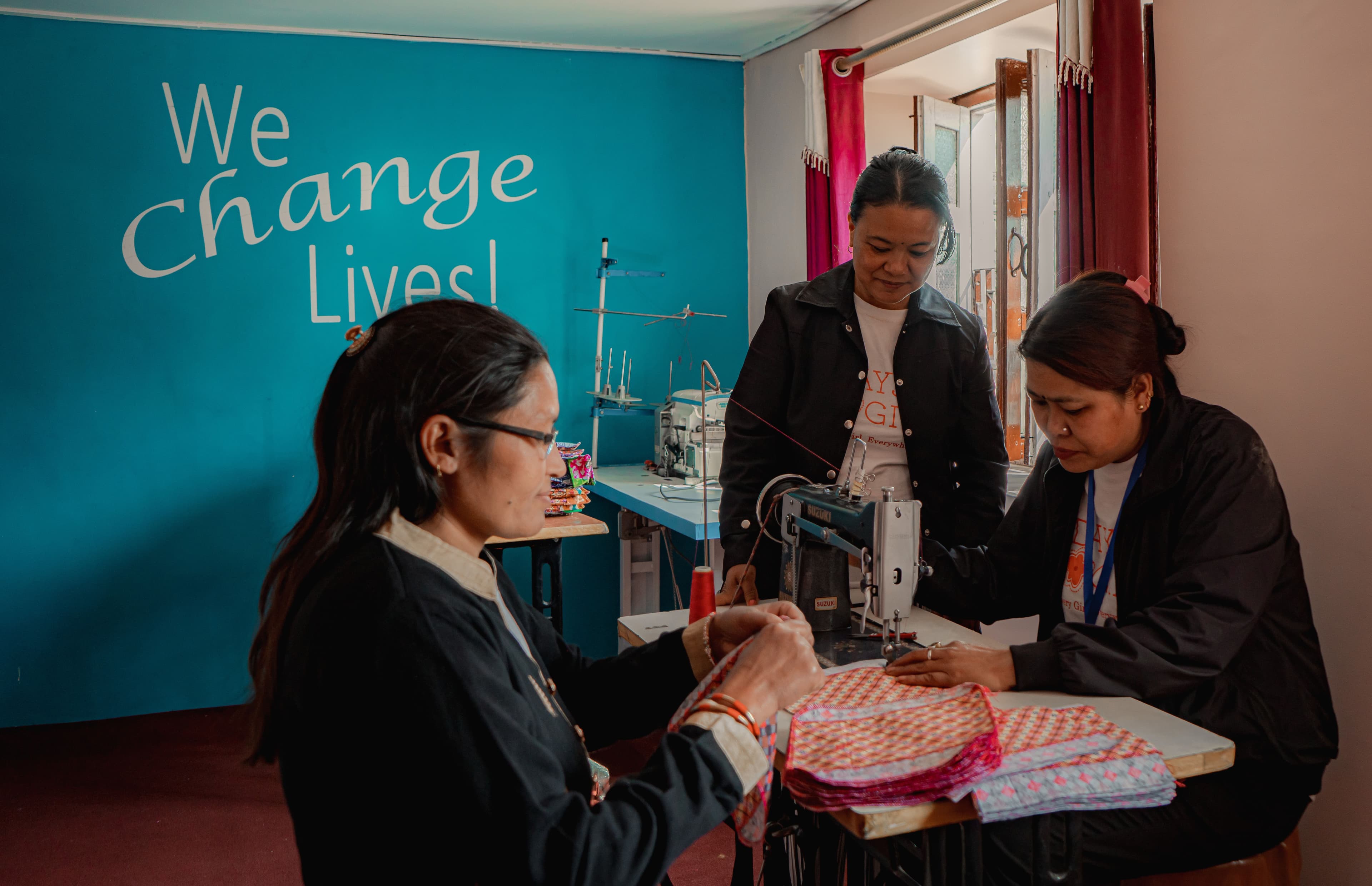- All
- Personal
- Active
Project 49: Empowering Women to New Heights – Nepal
Bringing menstrual health solutions to Nepal, this project will produce and distribute 1,000 sustainable washable pad kits, 500 Covid-19 protective masks and run education sessions on Chhaupadi Pratha and its negative consequences via women’s circle community groups.Read more
Project 49: Empowering Women to New Heights – Nepal
This is our Second Partnership with Days for Girls, an organization increasing access to menstrual care and education and having a significant positive impact on young girls' health by tackling “period poverty” and gender inequality.
According to the World Bank, at least 500 million women and girls globally lack adequate facilities and supplies for menstrual hygiene management. Nearly 25% of all menstruators experience period poverty, meaning that they do not have what they need to manage their periods.
Research shows that girls’ inability to manage their menstrual hygiene in schools, results in school absenteeism, which in turn, has severe economic costs on their lives and that of their country. In Nepal, approximately 30 % of girls miss school each month as a result of their periods.*
On top of that, many young girls and women are forced to repeatedly use cloths and often these are not adequately washed and dried between uses, placing them at risk of urinary tract infections or other complications.
UNICEF reports that 95% of girls surveyed in Nepal's mid- and far-western regions faced some sort of restriction when having their first periods, such as Chhaupadi Pratha. Thisis an ancient custom where women and girls are sent away to isolated huts or sheds when they are on their periods or are in their postpartum period.This is because menstruation is seen as “impure” within Nepali culture. This is not just common to Nepal, but many other cultures share this perception too.
When they are forced to stay in these simple dwellings for several days it exposes them to life-threatening risks such as snake bites, physical assault, hypothermia from freezing temperatures and toxic smoke inhalation from fire fumes used to warm these sheds because of lack of ventilation. While the practice of Chaupadi is illegal in Nepal, many in the Kailali community continue the practice.
Project 49 will be supporting education sessions about the practice of Chhaupadi Pratha and heighten awareness around the negative consequences. Via Women’s Circles incorporating the local community, these sessions aim to address issues in a culturally sensitive manner.
The community-based approach and inclusion of local leadership in these programs are important because they help to ensure that our short-term investments (such as kit distribution and education sessions) also have long-term impacts (such as shifts in norms towards more supportive MH environments, including the abandonment of practices like Chaupadi).
Along with the distribution of reusable menstrual kits, this project aims to enable girls to live with dignity, keep attending school and help them break the cycle of poverty by enhancing female education.
*According to a research report by girl’s empowerment organization- Her Turn.
100% Funded
$25,500 of $25,500
People served
5000 served
Project category
Health & Hygiene
Location
Nepal
This is our Second Partnership with Days for Girls, an organization increasing access to menstrual care and education and having a significant positive impact on young girls' health by tackling “period poverty” and gender inequality.
According to the World Bank, at least 500 million women and girls globally lack adequate facilities and supplies for menstrual hygiene management. Nearly 25% of all menstruators experience period poverty, meaning that they do not have what they need to manage their periods.
Research shows that girls’ inability to manage their menstrual hygiene in schools, results in school absenteeism, which in turn, has severe economic costs on their lives and that of their country. In Nepal, approximately 30 % of girls miss school each month as a result of their periods.*
On top of that, many young girls and women are forced to repeatedly use cloths and often these are not adequately washed and dried between uses, placing them at risk of urinary tract infections or other complications.
UNICEF reports that 95% of girls surveyed in Nepal's mid- and far-western regions faced some sort of restriction when having their first periods, such as Chhaupadi Pratha. Thisis an ancient custom where women and girls are sent away to isolated huts or sheds when they are on their periods or are in their postpartum period.This is because menstruation is seen as “impure” within Nepali culture. This is not just common to Nepal, but many other cultures share this perception too.
When they are forced to stay in these simple dwellings for several days it exposes them to life-threatening risks such as snake bites, physical assault, hypothermia from freezing temperatures and toxic smoke inhalation from fire fumes used to warm these sheds because of lack of ventilation. While the practice of Chaupadi is illegal in Nepal, many in the Kailali community continue the practice.
Project 49 will be supporting education sessions about the practice of Chhaupadi Pratha and heighten awareness around the negative consequences. Via Women’s Circles incorporating the local community, these sessions aim to address issues in a culturally sensitive manner.
The community-based approach and inclusion of local leadership in these programs are important because they help to ensure that our short-term investments (such as kit distribution and education sessions) also have long-term impacts (such as shifts in norms towards more supportive MH environments, including the abandonment of practices like Chaupadi).
Along with the distribution of reusable menstrual kits, this project aims to enable girls to live with dignity, keep attending school and help them break the cycle of poverty by enhancing female education.
*According to a research report by girl’s empowerment organization- Her Turn.
